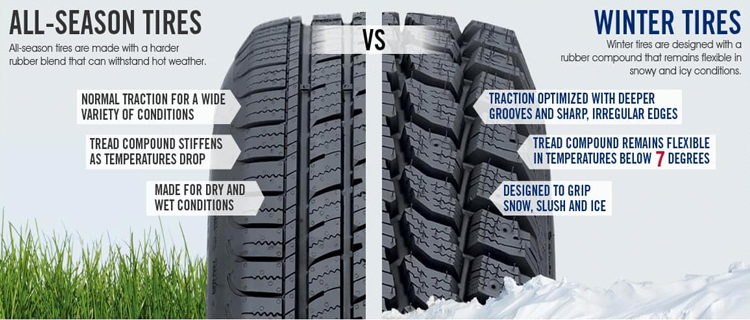Do All-Seasons Make Good Winter Tires?
December 2, 2020
Tires

Do all-seasons make good winter tires? Or just good enough? Read on to find out—or contact your local TIRECRAFT to discuss tire weather ratings and compare top brands.
Do All-Seasons Make Good Winter Tires?
For approximately three-quarters of Canadian drivers, the answer is no. According to the Tire and Rubber Association of Canada’s 2019 Winter Tire Report, 75% of motorists now use winter tires nationwide, up from less than half that number in 1998.
However, there is no universal answer to this question, as it depends entirely on your individual weather conditions, driving habits, and budget—not to mention the quality of all-seasons and winter tires you’re comparing. And while the majority of Canadians use winter tires, that still leaves 25% who don’t.
For instance, Vancouverites experiencing daily average highs of 9°C and nightly lows of only around 4°C probably won’t need winter tires, especially if they’re defensive city-drivers with short commutes. In fact, good winter tires actually lose grip in temperatures above 7°C. Accordingly, for these individuals, all-seasons fit the bill.
Of course, we’re not all so lucky—indeed, the majority of Canadians deal with ice, snow, sleet, and temperatures ranging from -5 to -40°C between January and February. For these individuals, winter tires are a must, and they’re even required by law in certain parts of the country (e.g. Quebec).
The best way to determine whether your all-seasons will make good winter tires is to check in with your local TIRECRAFT expert. With more than 220 locations around the country, there’s a good chance we’ve got a tire expert who’s familiar with your local weather conditions.
What’s The Difference Between All-Season Tires And Winter Tires?
Though we touched briefly on what separates all-seasons and good winter tires in the previous section, it’s best to understand the differences in detail before you buy. And according to a recent Globe and Mail report, many Canadians are still in the dark.
“We’ve heard everything from ‘The company is just trying to sell more tires,’ to ‘I don’t need them because I have all-wheel drive,’” Michelin Canada expert Carl Nadeau told the Globe and Mail.
But as you should know by now, all-wheel drive isn’t enough for most Canadian winters, and good winter tires are not sales gimmicks—they offer real safety and performance benefits. This is borne out by research from the Tire and Rubber Association of Canada, which found that 80% of winter tire owners believed that driving a vehicle equipped with winter tires saved them from being involved in a potentially hazardous driving situation in 2019. Likewise, a study showed that even when worn, good winter tires outperform brand-new all-seasons, braking 18% faster on ice and snow, and cornering 48% better.
The main differences between all-seasons tires and good winter tires boil down to:
- Rubber compound—Cold road conditions require a softer tread compound, which provides better grip, whereas all-seasons use a harder compound that lasts longer in warm weather.
- Tread pattern—All-seasons use finer tread not fit for snow and slush, whereas winter tires use a blocky tread with siping (fine slits in the tread), designed to grip snow and push away slush.
- Performance rating—Most all-seasons tires are rated “M+S,” for mud and light snow, whereas good winter tires receive the three-peak mountain snowflake symbol on their sidewall, which means they meet nordic winter performance tests designed by the American Society for Testing and Materials (ASTM).
Browse All The Best Rated Winter Tires And All-Seasons At TIRECRAFT
Contact your local TIRECRAFT to learn more about the differences between winter tires and all-seasons, and to compare all the best rated tires under one roof!
Back

